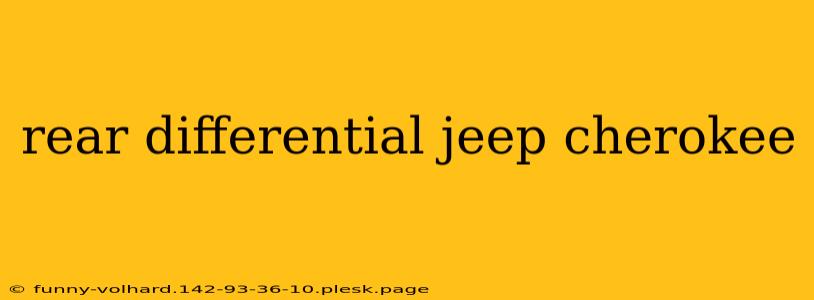The rear differential in your Jeep Cherokee is a critical component responsible for transferring power from the driveshaft to the rear wheels, allowing them to rotate at different speeds during turns. Understanding its function, common problems, and maintenance is crucial for ensuring optimal performance and longevity of your vehicle. This guide delves into the specifics of the Jeep Cherokee rear differential, providing valuable insights for both novice and experienced Jeep owners.
Understanding the Jeep Cherokee Rear Differential
The rear differential, often simply called the "diff," is a complex system housed within a sturdy casing. Its primary function is to accommodate the differing rotational speeds of the rear wheels during turns. When cornering, the outer wheel travels a greater distance than the inner wheel; the differential allows for this difference in speed, preventing wheel slippage and tire wear. The Jeep Cherokee, depending on the model year and trim level, may utilize different types of differentials, including open differentials, limited-slip differentials (LSDs), and locking differentials.
Types of Differentials in Jeep Cherokee Models:
-
Open Differential: The most common type, an open differential allows the wheel with the least resistance to spin freely, which can lead to wheel spin in low-traction situations. This is the standard setup in many Jeep Cherokee models.
-
Limited-Slip Differential (LSD): LSDs reduce wheel spin by providing some resistance to one wheel spinning while the other remains stationary. This improves traction significantly, particularly off-road. Several Jeep Cherokee models offered LSDs as optional equipment.
-
Locking Differential: A locking differential forces both rear wheels to rotate at the same speed, regardless of traction differences. This provides maximum traction in challenging off-road conditions, but can cause stress on drivetrain components during on-road driving.
Common Jeep Cherokee Rear Differential Problems
Over time, the Jeep Cherokee rear differential can experience several issues. These problems can manifest in various ways, impacting drivability and potentially causing more significant damage if left unaddressed.
Symptoms of a Failing Rear Differential:
-
Whining Noise: A persistent whining sound, particularly when turning or accelerating, often indicates low differential fluid or worn gears.
-
Grinding Noise: A grinding noise, especially when accelerating, could suggest damaged gears or bearings within the differential.
-
Vibrations: Unusual vibrations felt through the chassis can be a sign of problems with the differential assembly.
-
Leaks: Fluid leaks from the differential housing indicate a seal failure, which necessitates immediate attention to prevent catastrophic damage.
-
One Wheel Spin: Excessive wheel spin on one rear wheel during acceleration, even on surfaces with good traction, could point towards a failing open differential.
Maintaining Your Jeep Cherokee Rear Differential
Regular maintenance is key to extending the life and performance of your Jeep Cherokee's rear differential. This includes routine checks and timely fluid changes.
Essential Maintenance Tasks:
-
Fluid Changes: Differential fluid should be changed according to the manufacturer's recommended schedule, typically every 30,000-60,000 miles. Using the correct type of gear oil is crucial for optimal performance and lubrication.
-
Fluid Level Checks: Regularly check the differential fluid level using the dipstick (if equipped). Low fluid levels can lead to premature wear and damage.
-
Visual Inspections: Periodically inspect the differential for any signs of leaks, damage, or unusual wear.
Repairing or Replacing the Rear Differential
If you suspect a problem with your Jeep Cherokee's rear differential, it's best to consult a qualified mechanic for diagnosis and repair. Repair options range from simple fluid changes and seal replacements to more extensive repairs involving gear replacements or even a complete differential overhaul. In some cases, a complete differential replacement might be necessary. The complexity and cost of repair will depend on the specific problem and the model year of your Jeep Cherokee.
This guide provides a general overview; specific details may vary depending on your Jeep Cherokee model. Always consult your owner's manual for model-specific information and maintenance schedules. Regular maintenance and prompt attention to any issues will help keep your Jeep Cherokee's rear differential functioning smoothly for many miles to come.

